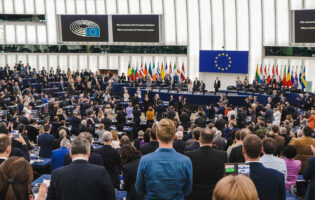The French Challenge

Alexander Privitera
AGI Non-Resident Senior Fellow
Alexander Privitera a Geoeconomics Non-Resident Senior Fellow at AGI. He is a columnist at BRINK news and professor at Marconi University. He was previously Senior Policy Advisor at the European Banking Federation and was the head of European affairs at Commerzbank AG. He focuses primarily on Germany’s European policies and their impact on relations between the United States and Europe. Previously, Mr. Privitera was the Washington-based correspondent for the leading German news channel, N24. As a journalist, over the past two decades he has been posted to Berlin, Bonn, Brussels, and Rome. Mr. Privitera was born in Rome, Italy, and holds a degree in Political Science (International Relations and Economics) from La Sapienza University in Rome.
The French government recently announced that the age of austerity is finally over—at least for France. That it will now disregard most of its commitments on reducing fiscal deficits represents a serious challenge to fellow members of the monetary union. Although the primary intended target is the German rules-based approach and Chancellor Angela Merkel’s management of the euro crisis, the move is a slap in the face of all those countries that were hit by the sovereign debt crisis and as a result slashed government expenses and were forced to embark on a series of painful structural reforms.
Structural Limits on French Growth
The French government is trying to exploit its exorbitant privilege of being one of the key pillars that underpin the political-institutional support for the euro zone. Throughout the crisis, markets never pushed French borrowing costs higher. They simply continued to be pegged to those of Germany, regardless of economic fundamentals. Its companies profited the most from the abundant liquidity provided to banks by the European Central Bank (ECB) through its liquidity injections, most notably its longer term refinancing operations (LTROs). Paris’ fiscal adjustment lagged behind that of other big euro area countries, most notably Italy. While occasionally talking the reformers’ talk—a trend that started with former president Nicholas Sarkozy—Paris never walked the walk. So far it has failed to deliver anything beyond a series of cosmetic measures.
France may sincerely believe that its current economic weakness is merely a reflection of a badly managed euro area crisis. It may believe that timid, carefully calibrated reforms will manage to provide just enough support to its economy to get it back on track. It may generally believe that if others were finally allowed (by Germany) to start spending and growing again, its own problems would simply melt away. But doing so would fly in the face of high labor costs, overly rigid labor markets, public regulatory pressure, and government spending that now stands at a whopping 55 percent of GDP. In short, these structural hindrances will continue to weigh down French growth even in the absence of the German obstinate insistence on bringing down fiscal deficits.
Matteo Renzi, Italy’s prime minister, is watching the brewing clash between Brussels/Berlin and Paris with keen interest. His instinct and a general Italian frustration with any kind of Berlin/Brussels imposed diktat would make him a prime candidate for siding with the French. Unlike France, Italy truly suffered and continues to suffer the consequences of the sovereign debt crisis. However, Renzi should be shrewd enough to understand that President Francois Hollande is currently weak and largely isolated. Renzi should also be aware of the fact that his country could need additional help from a key European institution in Frankfurt. If Italy openly sides with France, slows down its reform process, and clashes with Germany, any hope of getting even more monetary support from the ECB risks becoming a very elusive goal.
Can the ECB Keep Governments at Bay?
Recent decisions by the ECB suggest that the governing council is already feeling the ripple effects of mounting political tension between France and other member countries. The central bank is trying to stay above the fray. It decided to employ an external asset manager (or bank) to buy the securities on its behalf that will be purchased outright under the recently announced program. According to various media reports, the Banque de France opposed the decision because it strongly advocates a role for national central banks in implementing the asset-backed securities (ABS) purchases and did not want the private sector to be involved.
Perhaps I am reading too much into this, but my sense is that the ECB’s leadership is once again feeling the urgent need to inoculate itself more decisively against any accusation of acting on behalf of individual governments in anticipation of rockier times. With economic growth still very weak, fragile, and uneven, and with inflation teetering at the edge of a deflationary cliff, ECP president Mario Draghi needs to keep his options open and governments at bay, regardless of whether the implicit or explicit pressure is coming from France, Italy, or Germany. In what I would almost consider a slip of the tongue during his press conference last week, Draghi even felt that he needed to stress once again that the euro is irreversible. Since markets are not currently questioning that assertion, I wonder whether he felt compelled to speak out so forcefully because of mounting internal divisions within the governing council and between European chancelleries. In other words, France’s recent action could make it harder for the ECB to be bold.
France will also likely face stiff headwinds from Brussels, where the EU Commission has made it clear that it could take action once it reviews Paris’ budget proposal under the new EU rules that France helped to introduce. This is a potential clash that President Hollande’s government seems to welcome. The result of this spat could further erode the political standing of the European institution in member countries and further bolster the role of the Council in which national heads of state and government wrestle for compromises.
Gaining Support from External Actors
France may think that the timing of its latest decisions is particularly propitious. Its finance minister Michel Sapin will try to gain the support for its plans from key international institutions such as the IMF this week. More crucially, it will also try to enlist the U.S. government, which is traditionally very critical of Berlin’s euro crisis management. Certainly, if the debate is allowed to be narrowed down to a clash between growth versus austerity, it is easy to establish what sounds more appealing. Indeed, the media may even portray a Germany under attack on multiple fronts in coming days, largely isolated in Europe and abroad. However, instead of softening the government in Berlin, this dangerous power game could instead stiffen Chancellor Merkel’s resolve not to give in—she too is under pressure from a strengthening anti-euro party. Apart from wasting precious time—and we all know how costly that can be for vulnerable economies—this bickering may even result in a return of doubts among international investors about the future of the euro itself.
The bottom line is that if the French government chooses the open confrontation—and we should not forget that there is still a path back to a compromise solution—all euro member countries could end up suffering the consequences. It is true that Hollande is under increasing domestic political pressure from the right-wing Front National. However, pandering to nationalism will only trigger a reaction in kind among its neighbors across the Rhine. Instead of pushing France out of its slump, Hollande’s new courageous French way of dealing with its own current weakness could push the monetary union very close to a dangerous cul de sac. Not bad for a man known for his caution.









